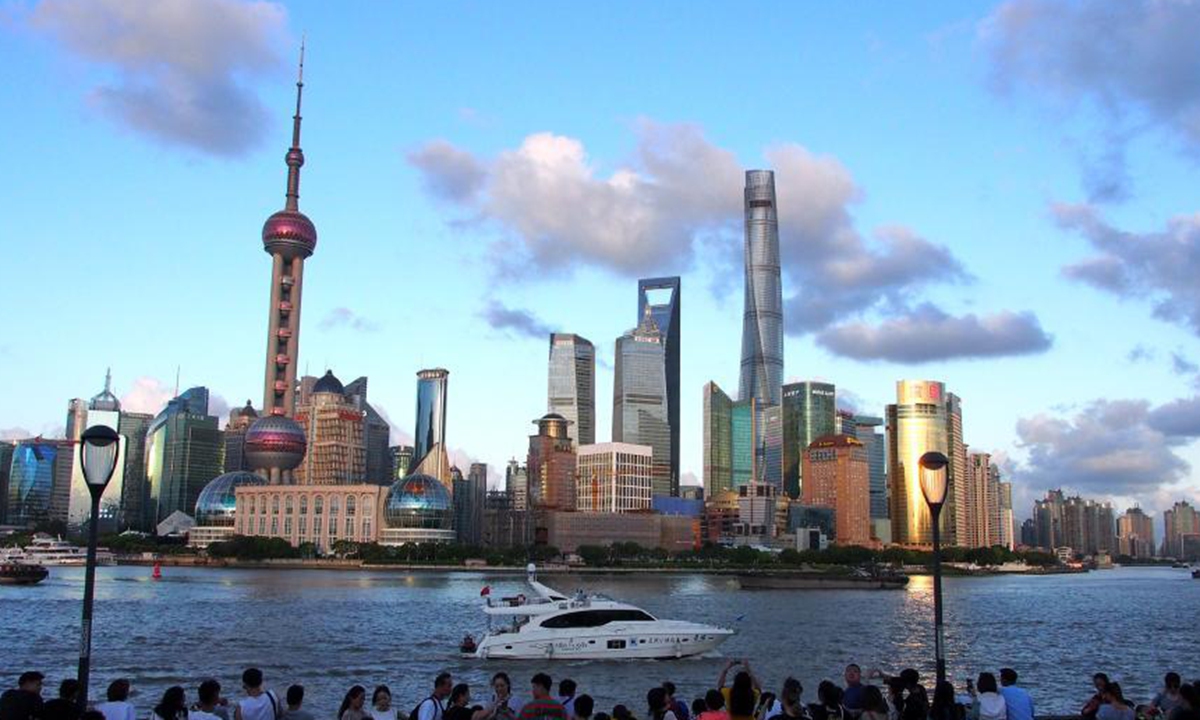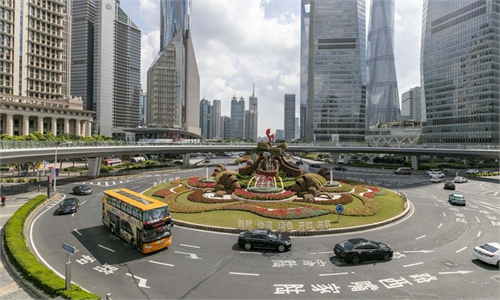Pudong to be global financial zone
Overseas asset managers eye opportunities in bond, yuan trading

People enjoy the view of Lujiazui at the Bund in east China's Shanghai, Aug. 2, 2019. This year marks the 30th anniversary of China's announcement that it would develop and open up Shanghai's Pudong, which epitomizes China's continuous efforts to deepen reforms and open its doors to the world.
Shanghai's Pudong New Area aims to attract more than 200 global institutional investors and five new legal person investment institutions this year, a government official in Pudong disclosed, as the country tries to model the area into an essential node of global financial resource allocation -- part of a blueprint to develop Pudong as China's socialist modernization pioneer zone in the coming years.
While the region moves to embrace more financial reforms, experts cautioned that China should not forget to "protect its financial sector like Iron Man" from any schemes of financial "crocodiles".
As a crucial part of China's goal to model Pudong into a socialist modernization pioneer area, a task put forward in a recent State Council guideline, the country is supporting Pudong to undertake financial reforms in a number of aspects.
Those reforms include developing yuan offshore transactions, pushing the unified opening-up of China's interbank and exchange bond markets, as well as establishing an international financial asset transaction platform in Pudong.
Zhang Hong, director of Pudong's Financial Work Bureau, said that one major reform Pudong is working on is creating a global financial asset transaction platform, which she described as an open platform that balances the two-way investment of domestic and overseas capital.
"We are accelerating research into specific business plans and transaction rules in partnership with relevant government departments, and we're trying to push the platform's landing as soon as possible," she told the Global Times.
Local authorities are also pushing a plan called GIC, which incorporates methods like rolling out more types of financial transaction products, attracting global financial investors and increasing transaction scales, so that Pudong can become a "highland" in concentrating financial institutions and capital, she said.
Apart from such major reforms, specific financial reforms have already been carried out in Pudong since the guideline was rolled out. For example, Pudong's Lujiazui Financial City on Wednesday launched nine measures to speed up the expanded presence of international financial asset management institutions in the region.
The methods include relaxing employment restrictions for overseas asset managers and enriching the categories of asset management investment products.
Those measures, to some extent, reflect Pudong's ambition to further enhance its role as one of China's financial hubs. The region has already achieved huge success in strengthening its financial industries over 30 years of development.
This reform blueprint is fuelling a lot of confidence and anticipation among overseas financial institutions, where executives predict that more overseas capital will be channeled into the Chinese market as a result of the reforms.
"The guideline has given us a lot to imagine, whether in the construction of the yuan offshore market or the integration of bond markets. We hope we can provide more ideas in terms of financial product innovation to help land those measures," Zhang Xiaolei, president of Standard Chartered Bank (China), told the Global Times.
She particularly mentioned that having the two bond markets integrated will facilitate overseas capital to enter the Chinese market in terms of product pricing, management and trading mechanisms, and the bank will be able to offer clients more reasonably priced financing channels and more types of financial products.
Qian Yujun, chairman of UBS Securities Co, told the Global Times that setting up of the offshore yuan market means a "certain level of free capital exchange", and companies like UBS can provide services related to the exchange and integration between domestic and overseas assets.
"We predict that allocations of 1 trillion yuan or even more will enter China's financial markets in the next three to five years," he said, adding that overseas investors are looking at the Chinese market's long-term investment values instead of short-term fluctuations.
However, as the reforms go on, experts said that China should keep in mind the importance of safeguarding financial security.
"The premise of financial reform success is to ensure the security of China's financial sector. We should be armed to the teeth to protect the financial industries, not only preventing financial 'crocodiles' from disrupting market operations, but watching out for certain countries that might come to take advantage of China's reforms," Wei Jianguo, former Chinese vice minister of commerce and executive deputy director of the China Center for International Economic Exchanges, told the Global Times.
He also said that it's not an easy task for Pudong to build a financial center, as it needs to boldly trial out a number of reforms to achieve capital account convertibility, such as how to grasp the opportunity of decreasing US dollar usage around the globe to push the yuan's internationalization.



